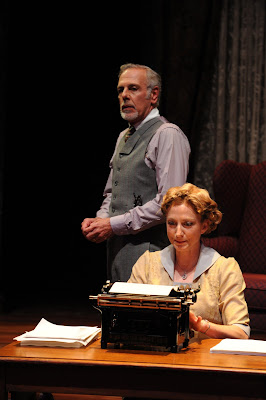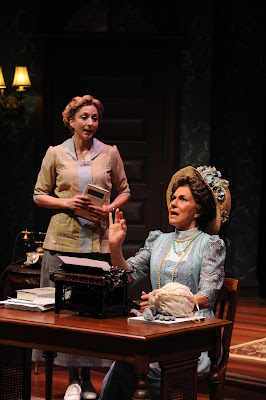 J. Fred Shiffman and Kate Eastwood Norris
J. Fred Shiffman and Kate Eastwood Norrisin Ghost-Writer, at Florida Stage.
(Photo by Ken Jacques)
By Hap Erstein
If you knew that a book called The Iron Whim describes itself as “a fragmented history of typewriting,” you may not bother to pick it up. But you will be glad that Michael Hollinger did, for it led him to create Ghost-Writer, his latest work to be produced by West Palm Beach’s Florida Stage.
For as dry as the book sounds, it is full of juicy literary anecdotes. “A couple of them dealt with Henry James, how the beginning of his dictating to his secretary really altered his writing style a great deal,” says Hollinger, who teaches theater at Philadephia’s Villanova University. “Most notably, after he died his secretary claimed to continue to receive dictation from him.”
That suggestion of supernatural communication from beyond the grave, or perhaps a good old-fashioned con game, was enough to get Hollinger studying James and the early 20th century as research for his play.
Ultimately, however, he decided not to use James as a character. “I quickly jettisoned James, because for me I was really interested in the relationship between the late writer and the secretary, particularly any romantic or sexual overtones that might be there,” he explains. “James was unmarried and probably homosexual anyway, so it didn’t have the same kind of charge I was looking for.”
Instead he invented Franklin Woolsey and his loyal, unattached secretary Myra Babbage, as well as Woolsey’s understandably jealous widow, making a three-character drama. In addition, there is an unseen interrogator, sort of a stand-in for the audience, sent by Mrs. Woolsey to debunk Myra’s far-fetched account of the words she hears from the next life.
While Ghost-Writer has a supernatural component, Hollinger suggests that it could also be seen as a play about artistic inspiration. “It was kind of the last place I got to in the play, the rumination about where do the words come from anyway,” he says. “And is there not a mystical quality to that? If words come to me inexplicably from some unknown place, why can’t the same words come to Myra and she consider them hers?”
 Kate Eastwood Norris and Lourelene Snedeker
Kate Eastwood Norris and Lourelene Snedekerin Ghost-Writer, at Florida Stage.
(Photo by Ken Jacques)
He set his play very deliberately in 1919. “I actually dabbled with the ‘30s for a while, a romantic era in some respects. However, one of the things that didn’t work about that period is that it was post the sexual revolution of the ‘20s,” explains Hollinger. “I felt that (for) the particular social restraint required for a man and woman working in the same room for hours on end, unsupervised, it really needed to be pre-‘20s.
“And particularly just post-war. Just after World War I, there was a real surge in spiritualism. So for all kinds of reasons, that year just felt right.”
Ghost-Writer is the fourth play of Hollinger’s to be produced at Florida Stage over the past 14 years, after Incorruptible, Red Herring and Opus. All seem wildly different, though the playwright says, “I do think that rhythm is something they share. A sensitivity to the sound that they make. The sound is very different in all cases, but I’m very attentive to the sounds. And I think that they all, to some degree, try to tease out a spiritual dimension or value out of the chaff of life.”
In recent years, Hollinger has been trying to bring a subtlety to his work that did not exist previously. “In ‘Opus,’ one of the things I was trying to do was write something more austere and spare and focused on human interaction. It felt like as I was maturing as a writer, I didn’t want to tap dance quite as much as I did when I was younger,” he says. “I wanted to see if the audience could be held with smaller gestures.”
With Ghost-Writer, he is trying to push that envelope further. “I thought, ‘All right, what if very little seems to happen, what if there’s a character who sits on the stage and says, “Nothing may happen today, but you have to pay really close attention, because if you don’t, you’ll miss it.” ’ I wanted to see how subtle the gestures could be and still compel an audience.”
The play, which opened Friday at the Rinker Playhouse, had its world premiere last fall at Philadelphia’s Arden Theatre Company, where many of his scripts first meet an audience. But Florida Stage is often a close second.
“Florida Stage is one of about three or four theaters only that will get the first look. It’s really because I know it’s OK if my underwear’s showing a little bit,” he says sheepishly. “That they’ll look through that and see what I’m getting at.”
Producing director Lou Tyrell responded quickly and enthusiastically. “I was so delighted, because the plays are so different,” says Hollinger. “I have such respect for a person and a company that really wants the next play to be the best version of whatever it is, not the last play you wrote.”
As with Opus, he hopes that Ghost-Writer makes its way to off-Broadway, though that is never his intention as he writes. “I don’t write plays for New York,” Hollinger insists. “I write them for whoever will do them. But I do think it’s a play that would work very well there. It’s got a New York setting and being literary, I think it might appeal to a lot of people there. I think it has the potential to be commercial.”
GHOST-WRITER, Florida Stage, Kravis Center’s Rinker Playhouse, 701 Okeechobee Blvd., West Palm Beach. Through Sunday, April 3. Tickets: $25-50. Call: (561) 585-3433 or (800) 514-3837.